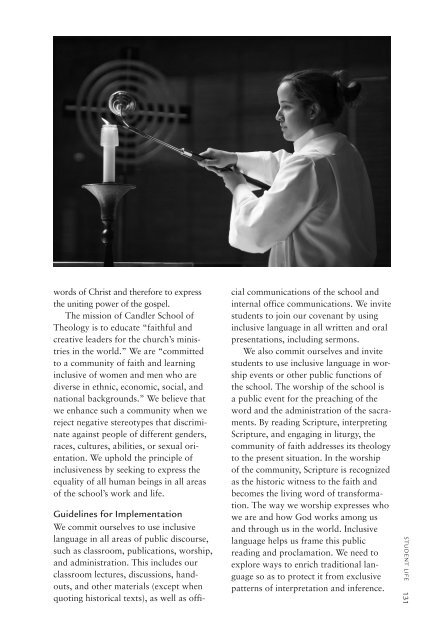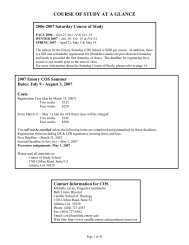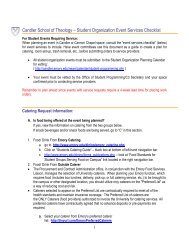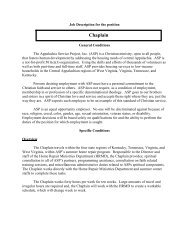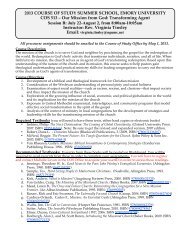academic calendar 2012–2013 - Candler School of Theology ...
academic calendar 2012–2013 - Candler School of Theology ...
academic calendar 2012–2013 - Candler School of Theology ...
Create successful ePaper yourself
Turn your PDF publications into a flip-book with our unique Google optimized e-Paper software.
words <strong>of</strong> Christ and therefore to express<br />
the uniting power <strong>of</strong> the gospel.<br />
The mission <strong>of</strong> <strong>Candler</strong> <strong>School</strong> <strong>of</strong><br />
<strong>Theology</strong> is to educate “faithful and<br />
creative leaders for the church’s ministries<br />
in the world.” We are “committed<br />
to a community <strong>of</strong> faith and learning<br />
inclusive <strong>of</strong> women and men who are<br />
diverse in ethnic, economic, social, and<br />
national backgrounds.” We believe that<br />
we enhance such a community when we<br />
reject negative stereotypes that discriminate<br />
against people <strong>of</strong> different genders,<br />
races, cultures, abilities, or sexual orientation.<br />
We uphold the principle <strong>of</strong><br />
inclusiveness by seeking to express the<br />
equality <strong>of</strong> all human beings in all areas<br />
<strong>of</strong> the school’s work and life.<br />
Guidelines for Implementation<br />
We commit ourselves to use inclusive<br />
language in all areas <strong>of</strong> public discourse,<br />
such as classroom, publications, worship,<br />
and administration. This includes our<br />
classroom lectures, discussions, handouts,<br />
and other materials (except when<br />
quoting historical texts), as well as <strong>of</strong>fi-<br />
cial communications <strong>of</strong> the school and<br />
internal <strong>of</strong>fice communications. We invite<br />
students to join our covenant by using<br />
inclusive language in all written and oral<br />
presentations, including sermons.<br />
We also commit ourselves and invite<br />
students to use inclusive language in worship<br />
events or other public functions <strong>of</strong><br />
the school. The worship <strong>of</strong> the school is<br />
a public event for the preaching <strong>of</strong> the<br />
word and the administration <strong>of</strong> the sacraments.<br />
By reading Scripture, interpreting<br />
Scripture, and engaging in liturgy, the<br />
community <strong>of</strong> faith addresses its theology<br />
to the present situation. In the worship<br />
<strong>of</strong> the community, Scripture is recognized<br />
as the historic witness to the faith and<br />
becomes the living word <strong>of</strong> transformation.<br />
The way we worship expresses who<br />
we are and how God works among us<br />
and through us in the world. Inclusive<br />
language helps us frame this public<br />
reading and proclamation. We need to<br />
explore ways to enrich traditional language<br />
so as to protect it from exclusive<br />
patterns <strong>of</strong> interpretation and inference.<br />
STUDENT LIFE 131


